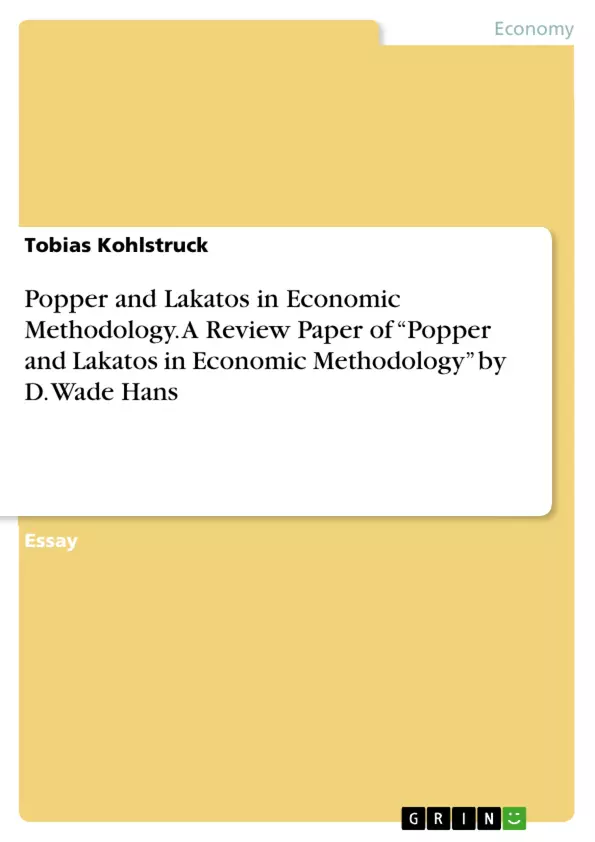This paper reviews the chapter “Popper and Lakatos in Economic Methodology” by Wade Hans published by Daniel M. Hausman in “The Philosophy of Economics” in 2008. The main purpose of this paper is to critically asses Karl Popper’s and Imre Lakatos’s methodological framework for economists consisting of both Popperian falsificationism and Lakatos’s ‘methodology of scientific research programmes’ (MSRP). The Popperian philosophy of science and its direct influence on the work of Imre Lakatos will be explicitly examined in terms of its influence and role in economic theory only, even though Popper’s philosophy of science and Lakatos’s MSRP were intended for science in general.
Inhaltsverzeichnis (Table of Contents)
- Popper and Lakatos in Economic Methodology
- Popper's Falsificationism
- Lakatos's Methodology of Scientific Research Programs (MSRP)
Zielsetzung und Themenschwerpunkte (Objectives and Key Themes)
This paper provides a critical review of Karl Popper and Imre Lakatos's methodological frameworks for economists, specifically focusing on Popperian falsificationism and Lakatos's Methodology of Scientific Research Programs (MSRP). The paper explores their influence on economic theory, examining how their methodologies, intended for science in general, apply specifically to economics. The analysis highlights the strengths and weaknesses of these frameworks in understanding and evaluating economic progress.
- Popper's concept of falsification and its limitations in economic methodology
- Lakatos's MSRP as a refinement of Popper's philosophy of science and its applicability to economics
- The role of empirical testing in economic theory and its relationship to falsification and corroboration
- The historical reconstruction of economic thought using Lakatosian categories and its impact on understanding theoretical progress
- The overall suitability of Popperian and Lakatosian frameworks for assessing economic progress.
Zusammenfassung der Kapitel (Chapter Summaries)
- Popper and Lakatos in Economic Methodology: This chapter introduces the central focus of the paper, which is to critically assess the methodological frameworks of Karl Popper and Imre Lakatos as applied to economics. It discusses the origins of Popper's falsificationism and its implications for scientific methodology, emphasizing its potential role in distinguishing science from non-science and guiding scientific research. The chapter explores how Popper's falsification approach might be applied to economic theories and examines some of the initial criticisms of this methodology in the context of economics.
- Popper's Falsificationism: This chapter delves deeper into Popper's falsificationism, exploring its strengths and weaknesses in the context of economic methodology. It addresses the Duhemian problem, which challenges the ability to isolate the specific cause of a falsification, as well as the limitations of qualitative comparative statics in falsifying economic theories. The chapter also touches upon the lack of a theory of verisimilitude in Popper's work and the potential implications of this for scientific progress. Finally, it explores the inherent difficulty in applying Popper's strict falsification approach to complex economic theories and phenomena.
- Lakatos's Methodology of Scientific Research Programs (MSRP): This section delves into Imre Lakatos's development of "sophisticated falsificationism," which aims to integrate Popper's rationalism into the "normal science" phase of Thomas Kuhn's paradigm shifts. Lakatos's MSRP introduces the concept of a "hard core" of a research program, which consists of unfalsifiable metaphysical presuppositions, and a "protective belt" of falsifiable auxiliary hypotheses. The chapter explores the implications of this framework for understanding theoretical progress in economics and highlights key differences between Lakatos's approach and Popper's falsificationism. It examines Lakatos's concept of corroboration and its relation to Popper's falsification, and discusses the historical use of Lakatosian categories in reconstructing the history of economic thought.
Schlüsselwörter (Keywords)
The main keywords and focus topics of the text include Popperian falsificationism, Lakatos's Methodology of Scientific Research Programs (MSRP), economic methodology, scientific progress, theoretical progress, empirical testing, corroboration, Duhemian problem, qualitative comparative statics, verisimilitude, hard core, protective belt, history of economic thought, and the limitations of these frameworks in the context of economics.
Frequently Asked Questions
What is Karl Popper's Falsificationism?
Popper's falsificationism is a scientific methodology which suggests that a theory is only scientific if it can be proven false through empirical testing.
What is Lakatos's Methodology of Scientific Research Programs (MSRP)?
MSRP is a framework that views science as a series of research programs consisting of a "hard core" of basic assumptions and a "protective belt" of auxiliary hypotheses.
How do these philosophies apply to economic methodology?
The paper examines how economists use falsification and research programs to evaluate theoretical progress and distinguish scientific economics from non-science.
What is the "hard core" in a research program?
The "hard core" consists of the fundamental, unfalsifiable metaphysical presuppositions that define a specific scientific research program.
What is the Duhemian problem in economics?
The Duhemian problem challenges the ability to isolate and falsify a single hypothesis because theories are often tested as a complex group of assumptions.
How does Lakatos's approach differ from Popper's?
While Popper focuses on strict falsification, Lakatos emphasizes the progression of research programs and how they handle anomalies without immediate abandonment.
- Arbeit zitieren
- Tobias Kohlstruck (Autor:in), 2017, Popper and Lakatos in Economic Methodology. A Review Paper of “Popper and Lakatos in Economic Methodology” by D. Wade Hans, München, GRIN Verlag, https://www.grin.com/document/416105



